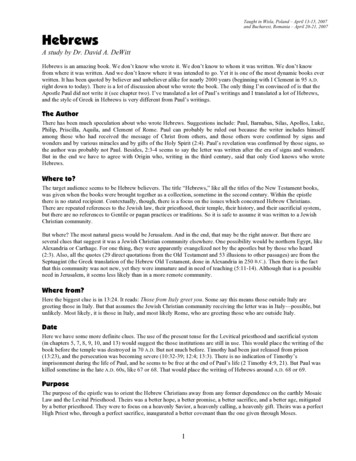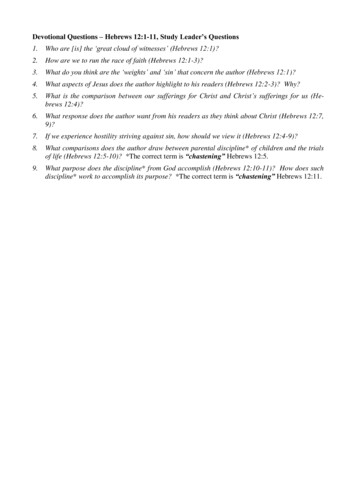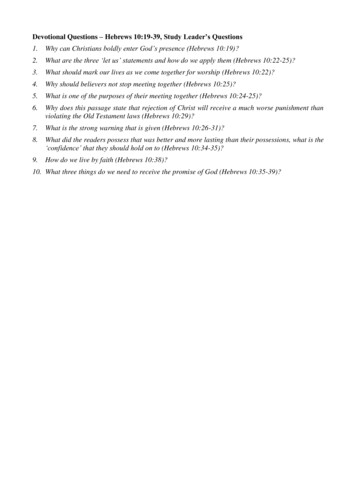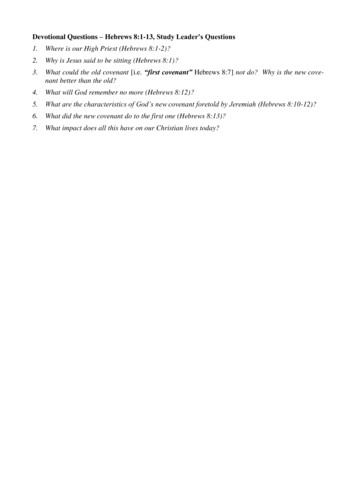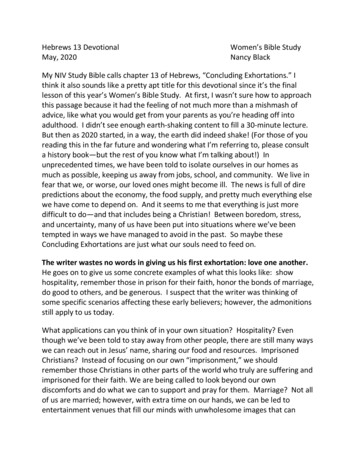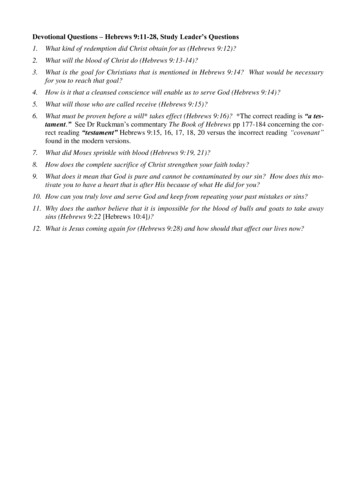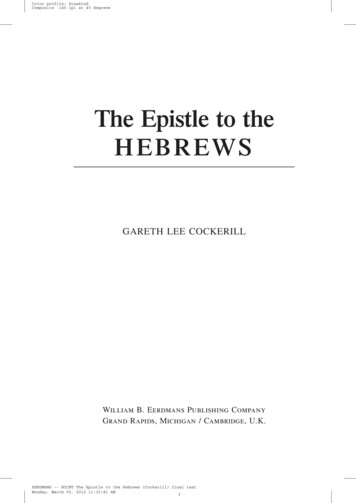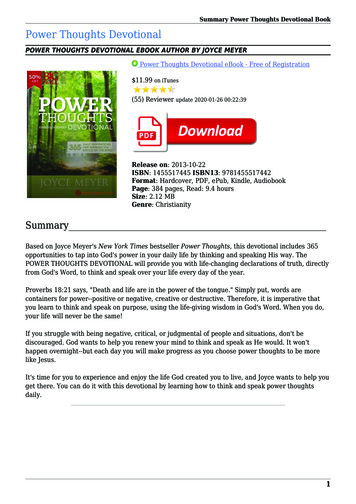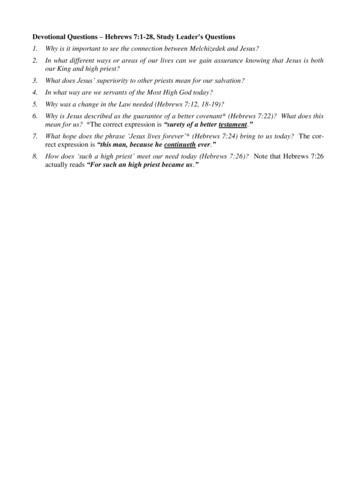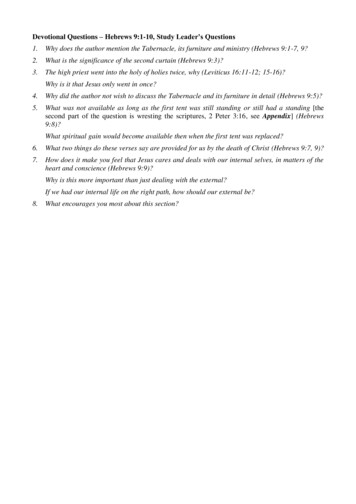
Transcription
Devotional Questions – Hebrews 9:1-10, Study Leader’s Questions1.Why does the author mention the Tabernacle, its furniture and ministry (Hebrews 9:1-7, 9?2.What is the significance of the second curtain (Hebrews 9:3)?3.The high priest went into the holy of holies twice, why (Leviticus 16:11-12; 15-16)?Why is it that Jesus only went in once?4.Why did the author not wish to discuss the Tabernacle and its furniture in detail (Hebrews 9:5)?5.What was not available as long as the first tent was still standing or still had a standing [thesecond part of the question is wresting the scriptures, 2 Peter 3:16, see Appendix] (Hebrews9:8)?What spiritual gain would become available then when the first tent was replaced?6.What two things do these verses say are provided for us by the death of Christ (Hebrews 9:7, 9)?7.How does it make you feel that Jesus cares and deals with our internal selves, in matters of theheart and conscience (Hebrews 9:9)?Why is this more important than just dealing with the external?If we had our internal life on the right path, how should our external be?8.What encourages you most about this section?
2Devotional Questions – Hebrews 9:1-10, Answers to QuestionsSee Dr Ruckman’s commentary The Book of Hebrews pp 158-166, 212-213 and the Ruckman Reference Bible p 1607 for detailed comments.1.Why does the author mention the Tabernacle, its furniture and ministry (Hebrews 9:1-7, 9?Paul mentions them to emphasise that, essential to Israel as they were, they “could not makehim that did the service perfect, as pertaining to the conscience” Hebrews 9:9 nor any of thepeople for whom he offered sacrifice.Paul’s purpose therefore is to focus his readers’ attention on “Christ being come an high priestof good things to come” Hebrews 9:11, whereby “shall the blood of Christ, who through theeternal Spirit offered himself without spot to God, purge your conscience from dead works toserve the living God” Hebrews 9:14.The Christian, therefore, having access to “the blood of Christ” for cleansing of the conscienceshould in practice always aim to keep short accounts with God by pleading the blood and in turnmake things right between him and others as necessary.“And herein do I exercise myself, to have always a conscience void of offence toward God,and toward men” Acts 24:16.2.What is the significance of the second curtain (Hebrews 9:3)?No-one could go directly to God while it stood.“The Holy Ghost this signifying, that the way into the holiest of all was not yet made manifest,while as the first tabernacle was yet standing” Hebrews 9:8.The individual needed a priest to get to God, to find out what God really said.“For the priest’s lips should keep knowledge, and they should seek the law at his mouth: forhe is the messenger of the LORD of hosts” Malachi 2:7.That intermediary has now been done away with by the Lord Jesus Christ.“For Christ also hath once suffered for sins, the just for the unjust, that he might bring us toGod, being put to death in the flesh, but quickened by the Spirit” 1 Peter 3:18.3.The high priest went into the holy of holies twice, why (Leviticus 16:11-12; 15-16)?Hebrews 9:7 explains why.“But into the second went the high priest alone once every year, not without blood, which heoffered for himself, and for the errors of the people:”Note that the high priest’s sacrifice of “the bullock of the sin offering, which is for himself”Leviticus 16:11 is consistent with the requirement of the law as set out earlier in the Book ofLeviticus.“If the priest that is anointed do sin according to the sin of the people; then let him bring forhis sin, which he hath sinned, a young bullock without blemish unto the LORD for a sin offering” Leviticus 4:3.The provision of “the goat of the sin offering, that is for the people” Leviticus 16:15 is for theremission, or forgiveness, of the sins of the people according to Hebrews 9:22 “And almost allthings are by the law purged with blood; and without shedding of blood is no remission.”That goat, however, is one of the pair whereby the second goat signifies the removal of the people’s sins, from which the common expression scapegoat arises.“And he shall take the two goats, and present them before the LORD at the door of the tabernacle of the congregation. And Aaron shall cast lots upon the two goats; one lot for the
3LORD, and the other lot for the scapegoat.the goat, on which the lot fell to be the scapegoat,shall be presented alive before the LORD, to make an atonement with him, and to let him gofor a scapegoat into the wilderness” Leviticus 16:7-8, 10.“And Aaron shall lay both his hands upon the head of the live goat, and confess over him allthe iniquities of the children of Israel, and all their transgressions in all their sins, puttingthem upon the head of the goat, and shall send him away by the hand of a fit man into thewilderness” Leviticus 16:21.In the Lord Jesus Christ, however, are “all things that pertain unto life and godliness” 2 Peter1:3; remission and removal of sin and sins, which justification accomplishes, redemption fromsin and imputed righteousness:“Being justified freely by his grace through the redemption that is in Christ Jesus: Whom Godhath set forth to be a propitiation through faith in his blood, to declare his righteousness forthe remission of sins that are past, through the forbearance of God; To declare, I say, at thistime his righteousness: that he might be just, and the justifier of him which believeth in Jesus” Romans 3:24-26.“For he hath made him to be sin for us, who knew no sin; that we might be made the righteousness of God in him” 2 Corinthians 5:21.“According as he hath chosen us in him before the foundation of the world, that we should beholy and without blame before him in love: Having predestinated us unto the adoption ofchildren by Jesus Christ to himself, according to the good pleasure of his will, To the praise ofthe glory of his grace, wherein he hath made us accepted in the beloved. In whom we haveredemption through his blood, the forgiveness of sins, according to the riches of his grace”Ephesians 1:4-7.Why is it that Jesus only went in once?See 2 Corinthians 5:21, three reasons exist: The Lord Jesus Christ “knew no sin.”“For even hereunto were ye called: because Christ also suffered for us, leaving us an example, that ye should follow his steps: Who did no sin, neither was guile found in hismouth” 1 Peter 2:21-22.“And ye know that he was manifested to take away our sins; and in him is no sin” 1 John3:5. He made one effectual sacrifice for sin.“Neither by the blood of goats and calves, but by his own blood he entered in once into theholy place, having obtained eternal redemption for us” Hebrews 9:12.“But this man, after he had offered one sacrifice for sins for ever, sat down on the righthand of God” Hebrews 10:12. The double entry was a feature of “the first covenant” Hebrews 9:1.As “the mediator of the new testament” Hebrews 9:15 and the Maker of “a new covenantwith the house of Israel and with the house of Judah” Hebrews 8:8, the Lord Jesus Christ“hath made the first old” and “that which decayeth and waxeth old is ready to vanishaway” Hebrews 8:8, likewise “the first testament” with respect to salvation for now, Hebrews 9:15, 18.
44.Why did the author not wish to discuss the Tabernacle and its furniture in detail (Hebrews 9:5)?Paul aims to discuss the Lord Jesus Christ “the mediator of the new testament” Hebrews 9:15in detail, which he does. See Hebrews 9:11-17, 23-28, 10:5-22, 29-31, 37-39.5.What was not available as long as the first tent was still standing or still had a standing [thesecond part of the question is wresting the scriptures, 2 Peter 3:16, see Appendix] (Hebrews9:8)?Direct access to God, for both Jew and Gentile“That at that time ye were without Christ, being aliens from the commonwealth of Israel, andstrangers from the covenants of promise, having no hope, and without God in the world”Ephesians 2:12.“The Holy Ghost this signifying, that the way into the holiest of all was not yet made manifest,while as the first tabernacle was yet standing” Hebrews 9:8.What spiritual gain would become available then when the first tent was replaced?Direct access to God, for both Jew and Gentile“For through him we both have access by one Spirit unto the Father. Now therefore ye areno more strangers and foreigners, but fellowcitizens with the saints, and of the household ofGod” Ephesians 2:18-19.“For Christ also hath once suffered for sins, the just for the unjust, that he might bring us toGod, being put to death in the flesh, but quickened by the Spirit” 1 Peter 3:18.6.What two things do these verses say are provided for us by the death of Christ (Hebrews 9:7, 9)? Perfect sacrifice for sin, Hebrews 9:7“For by one offering he hath perfected for ever them that are sanctified” Hebrews 10:14. Perfect purging of the conscience, Hebrews 9:9“How much more shall the blood of Christ, who through the eternal Spirit offered himselfwithout spot to God, purge your conscience from dead works to serve the living God” Hebrews 9:14.Paul therefore exhorts his readers:“This is a faithful saying, and these things I will that thou affirm constantly, that they whichhave believed in God might be careful to maintain good works. These things are good andprofitable unto men” Titus 3:8.7.How does it make you feel that Jesus cares and deals with our internal selves, in matters of theheart and conscience (Hebrews 9:9)?That “by the grace of God” 1 Corinthians 15:10, Paul’s exhortations with respect to the heartand conscience should be obeyed by means of both charity and faith. See Titus 3:8 above.“Now the end of the commandment is charity out of a pure heart, and of a good conscience,and of faith unfeigned” 1 Timothy 1:5.Part of exercising “a good conscience” to this writer was buying his other half a gift forMother’s Day, which he had earlier neglected to do but it is now done and has met with approval . Note Paul’s further exhortations with respect to the heart and conscience.“Let us draw near with a true heart in full assurance of faith, having our hearts sprinkledfrom an evil conscience, and our bodies washed with pure water” Hebrews 10:22 in the sensethat “that your body is the temple of the Holy Ghost which is in you, which ye have of God,and ye are not your own” 1 Corinthians 6:19 and water is a component of blood in that “one of
5the soldiers with a spear pierced his side, and forthwith came there out blood and water” John19:34 and “Jesus Christ, who is the faithful witness, and the first begotten of the dead, and theprince of the kings of the earth.loved us, and washed us from our sins in his own blood”Revelation 1:5.1 Timothy 1:5, Hebrews 10:22 are two of the only three verses in scripture where the words“heart” and “conscience” occur together. The third verse is Romans 2:15.Part of the application to “draw near” is to apply Ephesians 5:25 “Husbands, love your wives,even as Christ also loved the church, and gave himself for it” and ensure that for safety reasons, tyre pressures on this writer’s other half’s Corsa are checked regularly .Why is this more important than just dealing with the external?It is more important because God says “for the LORD seeth not as man seeth; for man lookethon the outward appearance, but the LORD looketh on the heart” 1 Samuel 16:7 and “thou desirest truth in the inward parts” Psalm 51:6.Note that “God.knoweth the hearts” Acts 15:8, their natural condition, Jeremiah 17:9, 10,Matthew 15:19, Mark 7:21, 22 and how to cleanse them, Luke 8:15 with Luke 24:32, as a picture of the imparted “word of Christ” Colossians 3:16 burning out the inner dross, “the drossfrom the silver” Proverbs 25:4. “And they said one to another, Did not our heart burn withinus, while he talked with us by the way, and while he opened to us the scriptures?”If we had our internal life on the right path, how should our external be?It should also be on the right path as King David sought and to an extent found.“He restoreth my soul: he leadeth me in the paths of righteousness for his name’s sake”Psalm 23:3.Psalm 23:3 applies in particular to the lads and their eventual other halves, as Paul also exhorts.“Wherefore come out from among them, and be ye separate, saith the Lord, and touch not theunclean thing; and I will receive you, And will be a Father unto you, and ye shall be my sonsand daughters, saith the Lord Almighty” 2 Corinthians 6:17-18.8.What encourages you most about this section?That whereas “The Holy Ghost” signified No Admittance “while as the first tabernacle was yetstanding” Hebrews 9:8, for “members in particular” of “the body of Christ” 1 Corinthians12:27 now and forever “ye are the temple of the living God; as God hath said, I will dwell inthem, and walk in them; and I will be their God, and they shall be my people” 2 Corinthians6:16.
6Appendix – Version Comparison with respect to Question 5: What was not available as long as thefirst tent was still standing or still had a standing (Hebrews 9:8)?By inspection, the wording of Question 5 gives two readings for the last part of Hebrews 9:8: as long as the first tent was still standing, the word “standing” being part of a verb denoting thephysical reality of the tabernacle as long as the first tent still had a standing, the word “standing” being a noun that implies statusor significance or position of importance – in the abstractIt should be noted first that the second reading gives rise to an awkward grammatical constructionwhen Hebrews 9:9 is considered following Hebrews 9:8. That construction is at least ambiguous andindeed potentially confusing. Note that the first reading, with the word “standing” as part of a verb,yields no such ambiguity.“.while as the first tabernacle was yet standing: Which was a figure for the time then present, inwhich were offered both gifts and sacrifices.” Hebrews 9:8-9.The word “Which” that begins Hebrews 9:9 clearly refers back to “tabernacle” as its antecedent,explicitly identified in Hebrews 9:9 as a place of offerings and sacrifices. No confusion arises. Notenow the ambiguity that arises from the second reading, with the word “standing” as a noun, whenHebrews 9:9 follows.“as long as the first tent still had a standing” applying to Hebrews 9:8“Which was a figure for the time then present, in which were offered both gifts and sacrifices.”Hebrews 9:9The awkward grammatical construction arises because the immediate antecedent of “Which” in Hebrews 9:9 is now the word “standing” used as a noun, which if taken to mean status in the abstractis confusing because it implies that something in the abstract can be a place of offerings and sacrifices, which is nonsense. The reader then has to deduce that the word “Which” at the beginning ofHebrews 9:9 must instead refer to “tent” i.e. “tabernacle” and not “standing.” On that basis, theawkwardness of the grammatical construction that results from the second reading becomes readilyapparent. Grammar alone therefore indicates that the second reading is spurious, “For God is notthe author of confusion” 1 Corinthians 14:33.As indicated, however, and more seriously than an awkward grammatical construction, the secondpart of Question 5 is wresting the scriptures. The way the question is phrased implies as shownabove two distinctly different meanings – see remarks below on the various meanings of the word“standing” - for the expression “while as the first tabernacle was yet standing” Hebrews 9:8 i.e.“as long as the first tent was still standing or still had a standing” namely the physically standing ofthe first tabernacle versus a supposed spiritual status for the first tabernacle for the Jews of its time.Since each of those meanings is distinctly different from the other, both cannot be correct “For Godis not the author of confusion” 1 Corinthians 14:33. See above.The 1611 AV1611 and 2011 AV1611 give the first meaning.Agreeing unambiguously with the 1611 AV1611 and 2011 AV1611 are of the pre-1611 Bibles:The Tyndale, Matthew, Coverdale, Great, Bishops’, Geneva Bibles and the 1582 JR Jesuit RheimsNew TestamentThe 1385 Wycliffe Bible states “the former tabernacle having state.”The 1395 Wycliffe Bible states “the former tabernacle had state.”A hardback reprint of the 1388 Wycliffe New Testament in modern spelling has “the former tabernacle had stood.” This reading strongly suggests that the 1385, 1395 readings refer to a state of being or a state of existence, essentially in agreement with the AV1611 reading.
7That is, the pre-1611 Bibles all agree essentially with the 1611 AV1611 and 2011 AV1611, 10 versions in all.Agreeing unambiguously with the 1611 AV1611 and 2011 AV1611 are of the post-1611 Bibles:The 1749-1752 DR Douay-Rheims Bible Challoner’s Revision, 1881 RV, ASV, NASV, RSV,NRSV, JB Jerusalem Bible, NJB New Jerusalem Bible, 1978, 1984 NIVs, NKJV, NWT New WorldTranslation, CEV Contemporary English Version, ESV English Standard Version, GNT Good NewsTranslation, HCSB Holman Christian Standard Bible, NET New English Translation, 17 versions inallThe NCV New Century Version has “the system of the old Holy Tent was still being used.”The NLT New Living Translation has “as long as the Tabernacle and the system it represented werestill in use.”The 2005 TNIV, 2011 NIV have “as long as the first tabernacle was still functioning.”Note that the NCV, NLT, 2005 TNIV, 2011 NIV refer to the use of the first tabernacle, not explicitlyto its standing in the sense of spiritual status or significance.Of the 31 English versions listed in comparison with the 1611 AV1611 and 2011 AV1611, therefore, 27 agree essentially with the 1611 AV1611 and 2011 AV1611 and four have readings that refer to the use of the first tabernacle but still, therefore, do not match the reading “still had a standing.” That is, no English bible version that is relatively well known, of the 33 versions listed, has theprecise reading “still had a standing.” None of them has come up with that particular reading inover 600 years.Of the Greek-English Interlinears that this writer consulted:Nestle’s 21st Edition Interlinear has “having standing.”Ricker Berry’s Edition of Stephanus’s 1550 Received Text Interlinear has “having a standing.”The Farstad-Hodges ‘Majority’ Text Interlinear has “having an existence” or “was standing,” whicheffectively matches the 1611 AV1611 and 2011 AV1611.The proposed alternative reading could therefore have been extracted from current Greek-EnglishInterlinears but these sources are clearly not all agreed on the proposed reading “still had a standing,” which for that reason alone is doubtful.Note also that the Nestle and Ricker Berry readings “having standing” and “having a standing” donot necessarily infer spiritual status or significance – see remark above:From The Free Dictionary, www.thefreedictionary.com/standing, this writer’s emphases:Standing, n1.a. Status with respect to rank, reputation, or position in society or a profession.b. High reputation; esteem: a person of standing in the community.2.Continuance in time; duration: a friendship of long standing.3.Law The right or capacity to initiate a suit.4.The act of one that stands.5.A place where a person or thing stands.6.Standings: Sports: A listing of individual competitors or of teams in a league according to theirrecord of performance.Of the above definitions of the word Standing, n, the first meaning is the one most commonly usedand, as indicated above, is the meaning inferred by the wording of Question 5. However, given the
8overwhelming agreement of the various versions with the AV1611 reading and that of the FarstadHodges ‘Majority’ Text Interlinear, the fifth meaning could be the intended meaning of the Nestleand Ricker Berry readings, which in turn would match the AV1611 reading.Therefore, the proposed reading “still had a standing” with respect to status becomes more uncertainbased on ‘the Greek’ i.e. it is ambiguous.It should finally be noted that the King James translators who translated the Book of Hebrews included scholars of the calibre of Dr John Spencer, who was elected Greek lecturer for Corpus ChristiCollege, Oxford, at the age of 19. See Translators Revived by Alexander McClure p 177.Dr Spencer and his colleagues could therefore hardly be perceived as unable to distinguish betweenphysical structure and spiritual status for the expression that they rendered as “while as the first tabernacle was yet standing” Hebrews 9:8 and therefore open to the notion that “the first tent was stillstanding or still had a standing.” Clearly the first reading is right and the second reading is wrong.Moreover, the AV1611 was not only “translated out of the original tongues” but “with the formertranslations diligently compared and revised, by His Majesty’s special command” - and “Where theword of a king is, there is power: and who may say unto him, What doest thou?” Ecclesiastes 8:4i.e. no-one has any God-given authority to change, amend or otherwise question the AV1611 Text.This writer believes therefore that the King’s men worked by inspiration*, especially with respect tothe comparison with “the former translations,” according to Scrivener’s remarks in The AuthorizedEdition of the English Bible (1611) by F. H. A. Scrivener, Cambridge, 1884, Wipf and Stock Publishers, 2004, p 140n, this author’s emphasis.“Yet John Seldon, who was twenty-seven years old in 1611, and must have had means of informationnot open to us, is represented in his Table Talk (p. 6) as speaking thus: “The translation in KingJames’ time took an excellent way. That part of the Bible was given to him who was most excellentin such a tongue – as the Apocrypha to Andrew Downes” [Regius Professor of Greek, 1585-1625].He adds moreover this interesting piece of information, to whatever part of the work it may apply:“Then they met together, and one read the translation, the rest holding in their hands some Bible,either of the learned tongues, or French [Olivetan, 1535, The Pastors, 1588], Spanish [Pinel 1553,De Reyna 1569, the Valencia Bible of 1478 revised by De Valera 1602], Italian [Bruccioli 1532?, ormore probably Diodati 1607], &c. If they found any fault, they spoke; if not, he read on.””*For an overview of God’s manner of refining the words that He gave by inspiration in English, seeThe purification of the Lord’s word – Psalm 12:6-7 www.timefortruth.co.uk/why-av-only.Modern version committees, it should be noted in passing, do not work by comparison with “theformer translations” as the King’s men did and none of them have ever been convened by “the wordof a king.” None of the modern versions, therefore, has any power of itself, e.g. to bring in revival.No nationwide revival, for example, with the possible exceptions of the extenuating circumstances ofWW1 and 2, has occurred in Britain for over 130 years.It appears therefore most compelling to this writer that of both English and foreign language pre1611 faithful precursors to the AV1611, none had any regard for the reading “still had a standing”in Hebrews 9:8 and, even though intent on replacing the AV1611 by means of any pretext whatsoever, no matter how devious or superficial, neither did any versions that emerged in the post-1611era apart from a couple of Greek-English Interlinears, which are not definitive and certainly not “allscripture” that “is given by inspiration of God” 2 Timothy 3:16 for the New Testament.It is this writer’s conclusion, therefore, that the reading “still had a standing” with respect to theterm “standing” in reference to status should be discarded as spurious. Even if devotional application is made from the expression “still had a standing,” it should be emphasised that the expressionis clearly not scripture as an ‘alternative’ translation and, as indicated above, to imply otherwise is towrest the scripture, 2 Peter 3:16.
See Dr Ruckman's commentary The Book of Hebrews pp 158-166, 212-213 and the Ruckman Refer-ence Bible p 1607 for detailed comments. . in detail, which he does. See Hebrews 9:11-17, 23-28, 10:5-22, 29-31, 37-39. 5. What was not available as long as the first tent was still standing or still had a standing [the
